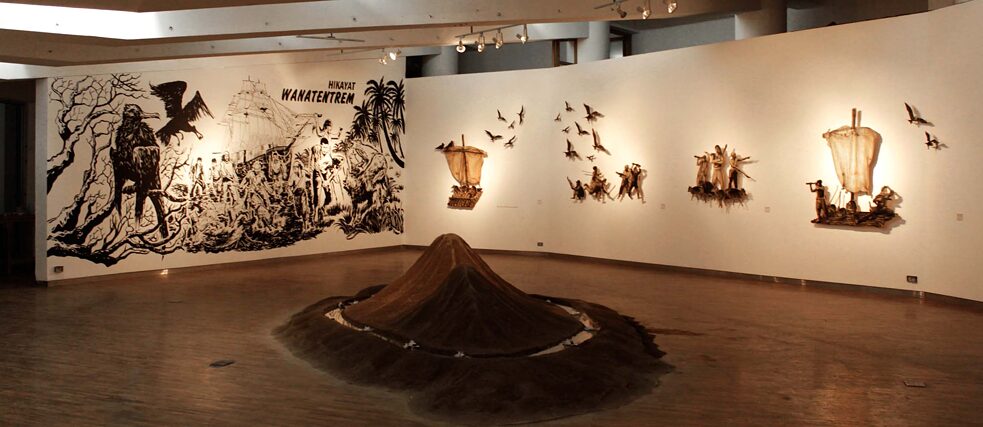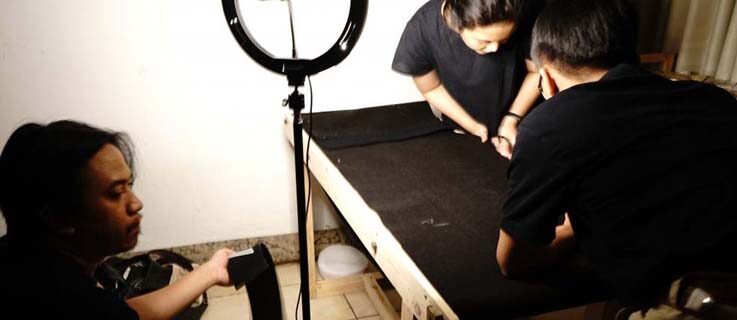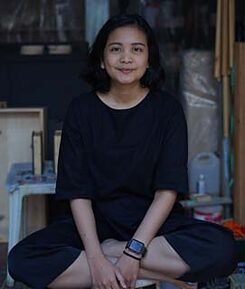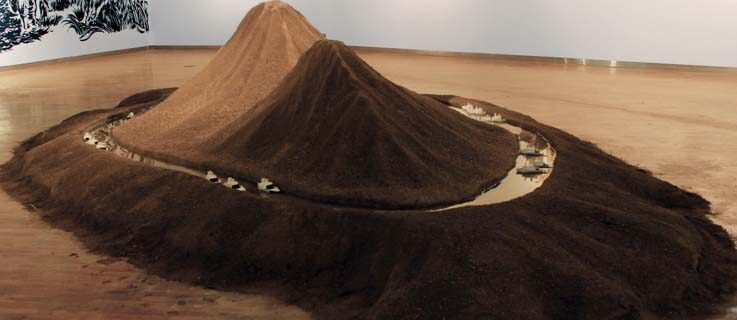Talk with Maharani Mancanagara
Diving Deeper, Reaching Further: Notes on Maharani Mancanagara’s Artistic Practice

Artist Maharani Mancanagara has developed a board game during the pandemic based on her work entitled “Hikayat Wanatentrem”.
Many stories underlie Maharani’s persona and works. One of them concerns her journey to different regions to explore notes left behind by her grandfather—about creative methods and ways to present a sensitive issue so that everyone can acknowledge and appreciate it.
How do you adapt in the midst of the pandemic to keep productive?
My creative process usually involves a Iot of travelling, meeting people, talking with them, interviewing them. I also collect data, take pictures and gather documents. But of course the pandemic has imposed restrictions on travelling and meeting people, especially older people.
Current digital and virtual communication methods such as long-distance telephone and video calls have helped me maintain my productivity and keep working. Many exhibitions have also migrated to digital formats, a positive development that allows artists to distribute their works. However, for me it is rather unsatisfactory if I am unable to enjoy an exhibition directly.
What are you working on at the moment?
I am working on several works for exhibitions. Early in the pandemic many exhibitions were postponed or cancelled, but since mid-year I suddenly started receiving offers to hold exhibitions.
I am currently working on projects for this year and next year, and I am preparing for a postponed residency. I also have a long-term project with Misha Ahmad Azizia and Rio. We are developing “Hikayat Wanatentrem” in from of a board game or game-app.
 Behind the scene AMAN (Agenda Seniman) Goethe-Institut Bandung - Parodi Partikelir with Maharanimancagara. | © Kemala Montesa / Saturasi Moments
Behind the scene AMAN (Agenda Seniman) Goethe-Institut Bandung - Parodi Partikelir with Maharanimancagara. | © Kemala Montesa / Saturasi Moments
My initial inspiration, the trigger to create, derives from a conversation I had with “Pak” Tisna Sanjaya, one of my lecturers at university. He said: “Artists have to be honest in their creative process, honest about their experiences. You have to know yourself and your roots.” This became the starting point of my efforts to explore my roots and those of my family.
It was also the starting point of my creative journey, during which I got to know my grandfather through his diary and the periods he recorded in it. There was one chapter in his diary I first became aware of during my university studies; it turns out that my grandfather had been taken to Buru Island with a number of his friends. He said they were brought to the island to undergo training to be transformed into better Indonesian citizens. This intrigued me. The notes in my grandfather’s diary differed from what I had learned in school about the events of 1965.
Those historic events are still considered sensitive in Indonesia. How do you present sensitive issues so that the public can acknowledge them? Do you use a specific method?
 Maharani Mancanegara
| © Maharani Mancanegara
After finding the trigger of an issue, I start collecting private stories—unrecorded stories or those that rarely rise to the surface. I then process the stories and narratives, reshaping them into different forms. In 2018, for example, I wrote a fairy tale with simplified characterization: actors involved in the events of 1965 are cast metaphorically as animals commonly found in Indonesia.
Maharani Mancanegara
| © Maharani Mancanegara
After finding the trigger of an issue, I start collecting private stories—unrecorded stories or those that rarely rise to the surface. I then process the stories and narratives, reshaping them into different forms. In 2018, for example, I wrote a fairy tale with simplified characterization: actors involved in the events of 1965 are cast metaphorically as animals commonly found in Indonesia.The first time I transformed a work into a fairy tale was for my solo exhibition entitled “Zero Sum Game” at Galeri Soemardja in 2018. I presented it as an illustrated storybook; it has since been translated into several languages. The exhibition included an installation of an island named “Wanatentrem”, where a pirate crew forced the mouse deer character to work. Also, my colleague Misha Ahmad Azizia performed a piece that I had included in the storybook; he turned it into a shadow puppet play for the entire exhibition audience of children and adults.
I plan to develop Hikayat Wanatentrem into a board game by retelling the story to make it accessible to a broader audience. Do you have specific hopes for those who have seen your exhibition?
I hope the work will increase the audience’s awareness about the importance of knowing and understanding one’s roots. This is what triggered me to delve into the topic. When I became aware of the issue, I set out to get to know my grandfather and dive deeper into the stories I learned while talking with people. Although not many people know this work, it is very important to me.
Talking about it a great deal has become a way for me to interest people in my current project and why I am working on it. This is my way of expressing what I find important.
 Solo Exhibition Maharani Mancanagara "Zero Sum Game" Work: Pulau Wanatentrem | © Maharani Mancanagara
Solo Exhibition Maharani Mancanagara "Zero Sum Game" Work: Pulau Wanatentrem | © Maharani Mancanagara
Maharani Mancanagara
In Agenda Seniman (AMAN), takeover Instagram account of Goethe-Institut Bandung, Maharani reflecting on historic narratives through a shadow puppet performance entitled Parodi Partikelir.Maharani Mancanagara is an artist who lives and works in Bandung. She is a graduate of Institut Technologi Bandung, Faculty of Art and Design, Graphic Art Department. She participates in exhibitions and other art events in Indonesia and abroad. Through her exploration of the medium of wood drawing, Maharani endeavors to express her ideas mainly focused on historical narratives, education, and personal stories that are often overlooked.
about aman
AMAN (Agenda Seniman) local artists and musicians takeover the Goethe-Institut Bandung’s Instagram channel from August – December 2020 and present their current works and daily activities during the COVID-19 pandemic. On every first Saturday of a month we hold live sessions by visiting studios or jam sessions and discussions on @goetheinstitut_bandung.